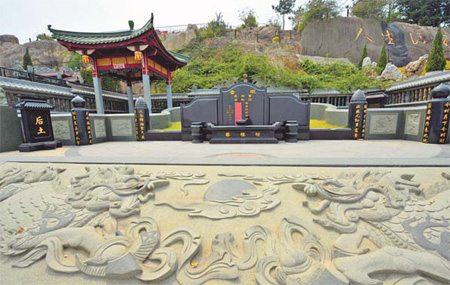Gov't buries concerns over cemetery fees
Loved ones worried over what to do when cemetery leases expire received some calming reassurances from China's Ministry of Civil Affairs.
 |
|
A luxurious grave, which costs 8 million yuan (US$1.2 million), is seen at the Anle Yongjiu (Ease and Happiness Forever) Graveyard, Xiamen, Fujian province. |
Despite various reports that burial plots leased under nearly two-decade old legislation would soon begin to expire, the ministry said the leases would comply with the standard national durations of 50 or 70 years.
In a statement issued on Monday on its website, the ministry said the 20-year period set out in the legislation was only the maximum amount of time for which grave administrators could charge management fees. People who bought burial plots do not need to repurchase them after 20 years, the ministry said, but only need to pay an extra management fee to extend the period.
The regulation, whose provisional version was issued by the Ministry of Civil Affairs in 1992, was meant to stop cemetery keepers from collecting huge amounts of money from advance payments. It gave purchasers of burial plots the right to use burial properties for up to 20 years, but did not clearly stipulate charges for renewal.
If the management fees are not renewed, the grave will be regarded as "ownerless", according to the regulation.
There are no specifications about what happens to "ownerless" plots.
"I feel so frustrated about the leasing term. It's ridiculous that you have to pay money again and again just to let your deceased relatives rest. What about those whose offspring who are out of contact?" said Mo Jun, 59, a Beijing resident.
However, Li Bo, deputy head of the social affairs department of the Ministry of Civil Affairs, stated in an earlier report that buyers only have leasehold rights, not property rights, and charges should be set according to contract provisions agreed to between the buyer of a burial plot and the seller.
"People misunderstood the charge. They thought they had to pay for the land every 20 years, but the fee is actually for the management services, just like you pay property management fees after you purchase a house," said Chen Qishun, head of the administrative office of the Fuyinyuan Cemetery in Zhongshan, Guangdong province, quoted by local newspaper Zhongshan Economic Times.
According to Chen, the management fee is usually used for maintenance and forestation in the graveyard.
The country's first groups of cemeteries that are approaching the 20-year time limit are located in Qingdao and Jinan, Shandong province.
"Since there are no specified standard charges in laws and regulations, we formulated the renewal charge by ourselves," said Sun Jianjun, deputy director of the Yuhanshan Cemetery in Jinan.
The graveyard charges a maximum of 15 yuan (US$2.30) per month for regular cemeteries, and 25 yuan for pricey cemeteries. The local price authority did not ratify the charge until 2010, when about 3,000 of the 40,000 graves in the cemetery had already been expired for one year.
"Since the price is relatively low, many people renewed management fees for 10 years for their deceased relatives," Sun said. "Although some wanted to pay for 20 years, we couldn't accept it because the price bureau of Jinan only approved a 10-year charge."
In Shenzhen, Guangdong province, the yearly management charge varies from 50 to 300 yuan, and some graveyard administrations set the fee by the area a grave occupies.
The cost is 50 yuan a year in Zhongshan.
However, even the low level of fees does not satisfy everyone.
"I believe that the keepers should not charge the management fee," said Liu Chen, 25, from Beijing.
 0
0 







Go to Forum >>0 Comments